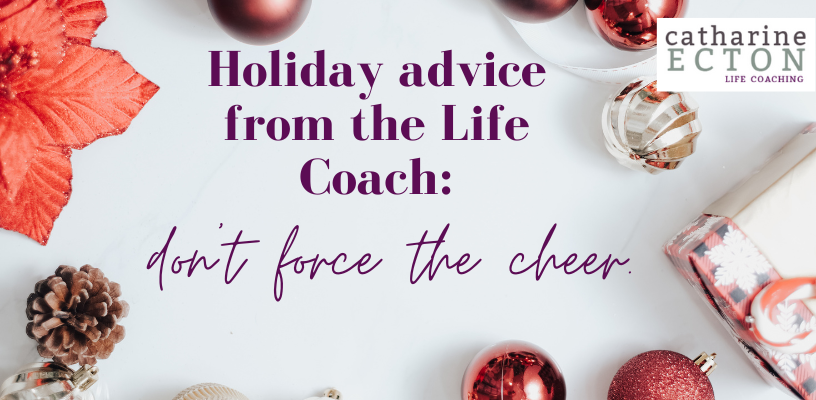
With Thanksgiving just around the corner, many of us are in preparation mode for the winter holidays.
The holidays are wonderful, but can be a double-edged sword. Along with the joy and togetherness, people often begin to seek my help as a life coach for the anxiety and pressure that pops up right around now – and often the sorrow and grief that starts surfacing without fail every year right around Thanksgiving.
The last few years – 2019, 2020, and 2021 – brought with them numerous changes, positive and negative, which may have altered some of our holiday experiences, traditions, and enthusiasm. Still, the holiday demands persist – cooking, shopping, gathering, and entertaining, just to name a few. On top of normal life stressors, these may even intensify or trigger other experiences– depression, anxiety, grief, adjustment to life changes, and illness, among others.
A survey conducted by the American Psychological Association found that 38 percent of people report a noticeable increase in stress during the holidays, with women (44 percent) more likely to experience holiday stress than men (31 percent). People identify lack of time, lack of money, commercialism/hype, and pressures associated with gift-giving as the primary culprits. Perceived obligations and responsibilities to meet expectations and create a positive, joyful experience for family members adds to holiday stress experiences with approximately half of men (49 percent) and women (51 percent) reporting pressure to make sure family members are happy.
The old songs, holiday parties, and festive decorations meant to bring joy can even serve as painful reminders of loss. They can be anxiety-producing for many of us, who become so busy making the holidays fabulous for everyone else that they fail to enjoy it themselves. If you or someone you care about is wondering how to get through the holidays this year, here are some life coaching best practices:
1. Don’t Force the Cheer
Don’t neglect yourself or your authentic feelings in the name of everything that has to be done “for the family” or to close out the books at work. In other words, don’t be a martyr to the holiday season or force the cheer. You’ll likely find that when you take excellent care of yourself, it is possible to be kinder and more giving to others. When you’re feeling well physically, the cheer comes more naturally.
Time doesn’t always heal, there is no one-size-fits-all for grief, and there is no timeframe on healing. Grief is the natural process by which you heal.
If you’re grappling with grief, it may be tempting to opt-out of the holiday season, or to numb yourself with alcohol, overwork, food – any number of things. Eventually, your feelings around holidays will shift, but grief is something that must be passed through, not avoided.
2. Boundaries, Boundaries, Boundaries
Don’t force yourself to participate in every holiday event or celebration. It is especially easy to get caught up in other people’s expectations or the commercial version of what the holiday season means “because we’ve always done it that way.” Taking the time for solitude and quiet can be helpful to anyone, especially those of us struggling with grief or anxiety.
If your schedule is chock-full of work and personal holiday parties, these back-to-back celebrations can start to feel overwhelming. Leave yourself time to be a human being and not just a human doing during the holidays. Give yourself some time to do absolutely nothing – or say “no” when you feel tired or overextended.
Keep our perspective as the year draws to a close. Tell your loved ones what you are struggling with, and of your healthy desire for some alone time.
3. Let Go of Control
This time of year is full of expectations we put upon ourselves to get it just “right.” We may tell ourselves things have to look, taste, feel, and be a certain way. We may even think things have to be “perfect, which of course, is never possible. It is especially easy to get caught up other people’s expectations or the commercial version of what the holiday season means. But taking the time to mindfully reflect on what matters, whether it be our religion or tradition, or even the healing power of love, helps us to keep our perspective as the year draws to a close.
Appreciating what we have in our own lives right now, focusing on gratitude, or “looking on the bright side,” can feel totally misguided, especially if we have lost something big – like a job, our health, or people we love. It’s completely okay to RSVP “no,” to limit your decorations, to shop for presents online only, or not at all. Choose a few things you can do to maintain your own authenticity about your level of “cheer,” and keep in mind that life goes on for other people. The festive music is unavoidable as the winter holidays draw closer, and it is okay that some people are happy and celebrating this year.
4. Be Okay With All the Feelings
The holidays bring about a wide range of emotions. You might feel joy, guilt, and sadness all within a few minutes. Tell yourself you’re okay with feeling those emotions. Release judgment of yourself and how you “should” or should not feel this season.
5. Ask for Help
Don’t be afraid to ask for help when you’re struggling with the holidays. Reminding loved ones that you’re having a rough time may be enough, but you also may want to reach out for more support.
Many of us are struggling right now. But Life Coaching can be a lifeline back to what makes your life so special.
“That was the best hour of my week!”
 So said my client Martha* after another very worthwhile and meaningful session. It validated that coaching works.
So said my client Martha* after another very worthwhile and meaningful session. It validated that coaching works.
Coaching can be hard work, especially around the holidays. We all have enough on our plate! But the right tools, powerful questions, and the courage to focus and adjust can help you find a peaceful place for you to experience this season in the way that makes sense for you. Let’s find the sweet spot to balance the changes – and let go of the anxiety and stress getting in the way.

Comments are closed, but trackbacks and pingbacks are open.